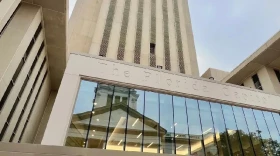TALLAHASSEE — After Gov. Ron DeSantis signed a major elections bill Wednesday, legal battles immediately began about new restrictions on voter-registration groups.
Organizations such as the League of Women Voters of Florida, the NAACP and Hispanic Federation filed three federal lawsuits arguing that the restrictions violate First Amendment rights and will harm efforts to sign up Black and Hispanic voters.
The Republican-controlled Legislature passed the bill (SB 7050) last month and DeSantis signed it Wednesday, hours before formally announcing that he will run for president in 2024. The bill focuses heavily on placing additional restrictions on “third-party” voter-registration groups, including dramatically increasing fines for legal violations and preventing non-U.S. citizens from handling registration applications.
“These onerous, overbroad, and vague requirements do not serve and cannot be justified by any compelling or legitimate state interest,” said a lawsuit filed Wednesday by the League of Women Voters of Florida and the League of Women Voters of Florida Education Fund. “The challenged provisions’ only aim, and indeed, only effect, is to limit the ability of 3PVROs (third-party registration groups) like LWVFL (the League of Women Voters) to register eligible Florida citizens to vote, and in so doing, persuade them to action by participating in the electoral process. Indeed, SB 7050 is part of a decades-long pattern of the Florida Legislature seeking to punish and deter the expressive conduct of third-party civic engagement organizations like LWVFL.”
Republican supporters, however, have argued that the changes are designed to bolster election security and protect information submitted by voters.
“There is no more sacred thing than our vote, and in this state, when it comes to our elections, we want to be crystal clear: It should be easy to vote and hard to cheat,” Rep. John Snyder, R-Stuart, said before the House passed the bill April 28.
DeSantis’ approval of the bill Wednesday and the resulting lawsuits marked the start of another chapter in years of political and legal fights about changes in Florida’s elections laws. Republican leaders in Florida and across the country have repeatedly pushed to make voting changes after former President Donald Trump lost his re-election bid in 2020.
The lawsuits, which were filed in federal court in Tallahassee, seek injunctions against the disputed parts of the bill and allege violations of First Amendment, due-process and equal-protection rights. While the League of Women Voters filed one lawsuit, another was filed Wednesday by a coalition of groups such as the NAACP, Disability Rights Florida and Alianza for Progress.
Hispanic Federation, the group Poder Latinx and individual plaintiffs filed a lawsuit Thursday.
The League of Women Voters and Hispanic Federation cases name as defendants Secretary of State Cord Byrd and Attorney General Ashley Moody. The coalition's lawsuit names as defendants Byrd, Moody and the 67 county supervisors of elections.
An underlying issue in the lawsuits is that the plaintiffs say voter-registration groups play an important role in registering Black and Hispanic voters. Black voters, in particular, are a key Democratic Party constituency.
The lawsuit filed by the coalition of groups alleges that the voter-registration restrictions “were purposefully enacted, at least in part, with a racially discriminatory intent to discriminate against Black and Hispanic voters and have the effect individually and collectively of denying, abridging, or suppressing the right to vote of otherwise eligible voters on account of race, ethnicity, or color.”
Among the issues targeted in the lawsuits:
- The bill significantly increases fines for violations by voter-registration organizations. As an example, groups could face a maximum of $250,000 in fines each year — five times the current $50,000 annual cap — for failing to submit completed registration applications to elections supervisors on time.
- The bill reduces from 14 days to 10 days the length of time groups have to turn applications in to elections supervisors.
- The bill bars non-citizens and people who have been convicted of certain felonies from handling voter-registration applications for the groups.
- The bill prevents the groups from retaining personal information about people who sign up to vote.
- The bill requires the groups to provide “receipts” to people who register.
The lawsuits allege, in part, that the bill violates political-speech rights protected by the First Amendment and would have a “chilling” effect on the groups. For example, one of the plaintiffs, Equal Ground Education Fund, expects to stop efforts to register voters during the upcoming election cycle because of the “increased risk of exorbitant fines imposed by SB 7050,” according to the coalition's lawsuit.
“By imposing prohibitive penalties on 3PVROs for any errors or omissions by any of its associates in voter registration activities, SB 7050 requires 3PVROs to take on potentially ruinous financial responsibility for its volunteers’ activities and thus severely hampers their expressive speech and conduct and ability to associate with a broad swath of members,” the League of Women Voters lawsuit said.
But during a House debate last month, Rep. Lawrence McClure, a Dover Republican who helped sponsor the measure, said the bill’s changes, at least in part, are designed to protect information submitted by voters.
“We are putting a priority on that voter’s personal information,” McClure said. “It should be the most sacred part of the entire interaction.”
WGCU is your trusted source for news and information in Southwest Florida. We are a nonprofit public service, and your support is more critical than ever. Keep public media strong and donate now. Thank you.




